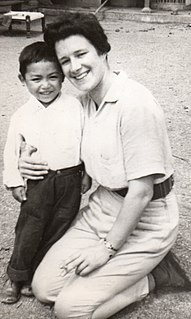A Quote by Charles Caleb Colton
A town, before it can be plundered and, deserted, must first be taken; and in this particular Venus has borrowed a law from her consort Mars. A woman that wishes to retain her suitor must keep him in the trenches; for this is a siege which the besieger never raises for want of supplies, since a feast is more fatal to love than a fast, and a surfeit than a starvation. Inanition may cause it to die a slow death, but repletion always destroys it by a sudden one.
Related Quotes
Woman must write her self: must write about women and bring women to writing, from which they have been driven away as violently as from their bodies - for the same reasons, by the same law, with the same fatal goal. Woman must put herself into the text - as into the world and into history - by her own movement.
The fact is that men need women more than women need men; and so, aware of this fact, man has sought to keep woman dependent upon him economically as the only method open to him of making himself necessary to her. Since in the beginning woman would not become his willing slave, he has wrought through the centuries a society in which woman must serve him if she is to survive.
You must learn her. You must know the reason why she is silent. You must trace her weakest spots. You must write to her. You must remind her that you are there. You must know how long it takes for her to give up. You must be there to hold her when she is about to. You must love her because many have tried and failed. And she wants to know that she is worthy to be loved, that she is worthy to be kept. And, this is how you keep her.
the sudden violent dispossession accompanying a refugee flight is much more than the loss of a permanent home and a traditional occupation, or than the parting from close friends and familiar places. It is also the death of the person one has become in a particular context, and every refugee must be his or her own midwife at the painful process of rebirth.
I say seduce her, seduce her tonight. Break the door down if you have to. Tell her all those things you said to me about her. You will love her more tomorrow than today and how you want to die with her hand in yours–which is an excellent line, by the way, that I fully intend to borrow when the time comes.
The plainest man that can convince a woman that he is really in love with her has done more to make her in love with him than the handsomest man, if he can produce no such conviction. For the love of woman is a shoot, not a seed, and flourishes most vigorously only when ingrafted on that love which is rooted in the breast of another.
But will I always love her? Does my love for her reside in my head or my heart? The scientist in her believed that emotion resulted from complex limbic brain circuitry that was for her, at this very moment, trapped in the trenches of a battle in which there would be no survivors. The mother in her believed that the love she hadd for her daughter was safe from the mayhem in her mind, because it lived in her heart.
It is fatal to be a man or woman pure and simple; one must be woman-manly or man-womanly. It is fatal for a woman to lay the least stress on any grievance; to plead even with justice any cause; in any way to speak consciously as a woman. And fatal is no figure of speech; for anything written with that conscious bias is doomed to death. It ceases to be fertilized.
And then she realized that his presence was the wall, his presence was destroying her. Unless she could break out, she must die most fearfully, walled up in horror. And he was the wall. She must break down the wall. She must break him down before her, the awful obstruction of him who obstructed her life to the last. It must be done, or she must perish most horribly.
She is Melusina, the water goddess, and she is found in hidden springs and waterfalls in any forest in Christendom, even in those as far away as Greece. (...) A man may love her if he keeps her secret and lets her alone when she wants to bathe, and she may love him in return until he breaks his word, as men always do, and she sweeps him into the depths with her fishy tail, and turns his faithless blood to water. The tragedy of Melusina, whatever language tells it, whatever tune it sings, is that a man will always promise more than he can do to a woman he cannot understand.
One day I'll give birth to a tiny baby girl and when she's born she'll scream and I'll tell her to never stop I will kiss her before I lay her down at night and will tell her a story so she knows how it is and how it must be for her to survive I'll tell her to set things on fire and keep them burning I'll teach her that fire will not consume her that she must use it





































